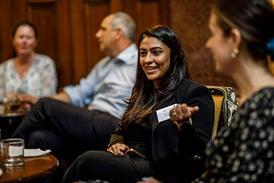The Competition Section held a diversity and inclusion reception on 1 November, hosted by Clifford Chance and supported by the Competition and Markets Authority (CMA). Amar Johal, our new committee member, reports on what was said.
Over 80 attendees came to hear speakers from across the competition community champion diversity, followed by an opportunity to meet those with a shared interest in the topic, and to discuss what more could be done to broaden the talent pool in competition law.
Shruti Hiremath (Senior Associate, Clifford Chance) gave introductory remarks outlining the purpose of the event – to encourage greater ethnic diversity within the competition community as a catalyst for progress. Shruti said that the reception was a platform for diverse minds, allowing attendees to create networks and identify role models (“if you see it, you can be it!”).
Manish Das (Legal Director, CMA) explained that while Sarah Cardell was unable to attend, he was delighted to continue the conversation about diversity and inclusion within the competition legal community on her behalf. Manish illustrated the scale of the challenge: while progress is being made at the graduate and mid-levels of seniority, and the picture at the CMA is better than in private practice, from senior associate upwards Black and Asian representation is lower than it should be based on the overall makeup of the workforce. Manish identified several positive CMA initiatives – such as their Race Action Plan and Black History Month event – but concluded that it is inspirational stories and role models who will ultimately make the difference and inspire us to take the next step.
Saira Henry (partner at Dechert) spoke next, sharing her story and thanking her mentors. Saira spoke of growing up as a little girl with grand aspirations in a white, working-class part of Croydon, where her violin case made her stand out on the bus home from school. Saira credited a quiz she was given at school for nudging her towards a career in law and then explained how she worked hard to get relevant work experience and a place at the University of Surrey to study law and economics.
Inspired to specialise in competition law during an Erasmus exchange in Mannheim, Saira was pushed by her tutor to work hard and take a placement at EDF in Paris relevant to her dissertation on the liberalisation of energy markets. After graduating, Saira obtained a placement at a Brussels-based non-profit and then a training contract at Freshfields Bruckhaus Deringer, before later joining Dechert.
Saira identified that black lawyers are underrepresented amongst city competition practitioners and said that it is the responsibility of both organisations and individuals to address this. Saira doesn’t believe in quotas but she highlighted the importance of sponsorship and affinity groups and commended an initiative by Dechert to specifically look at the billable hours of diverse associates. Saira concluded by saying that diverse individuals must also strive for excellence, safe in the knowledge they belong at their firms.
Shruti then conducted a Q&A with Michelle Yip (managing associate general counsel, competition law, HSBC). Michelle began by providing an in-house perspective about how HSBC had empowered her. Born in Hong Kong, Michelle moved to the UK aged 10 and as a result felt she was an outsider in both places. As a trainee at Freshfields in the mid-2000s, Michelle found there was a tendency for partners to sponsor versions of themselves, and there were a lack of role models for diverse solicitors.
Although Michelle could have moved to China to further her career, she wanted to stay in London. After joining HSBC in 2013, Michelle never felt like an outsider and highlighted that the bank really valued difference. Michelle observed that HSBC does allyship well and focuses on individuals who might be passively excluded or who just aren’t heard.
Michelle also highlighted what the HSBC legal function does to promote D&I specifically, commending the dedicated resource available and the focus on sharing, shifting and celebrating lived experience and intersectionality. She pointed out the enormous potential to exchange ideas within the competition community, highlighting HSBC collaboration efforts with Clifford Chance and Baker McKenzie. Michelle concluded by taking questions from the floor, emphasizing the potential to encourage change by reviewing the diversity of panel firms or counsel.
The event was closed by Ruchit Patel (partner at Ropes & Gray), who said that he’d never seen such honest discussion of problems within the competition community in his 20 years practising antitrust law. Ruchit said it was important for this to be a real moment of progress for competition practitioners that moved the debate forward, and that we must all be part of the solution.
Attendees then enjoyed networking drinks










